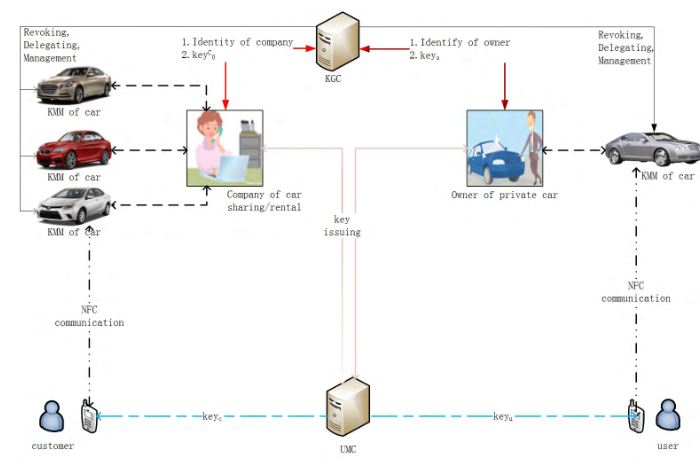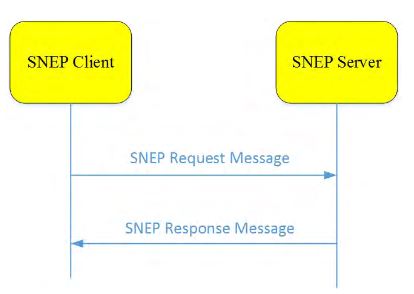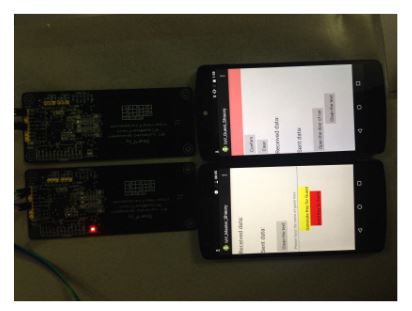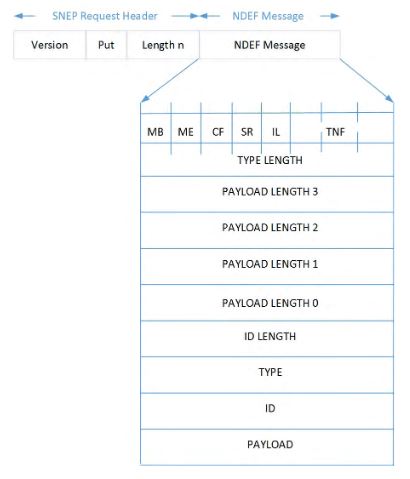ABSTRACT
Equipped with various sensors and intelligent systems, modern cars turn into entities with connectivity, autonomy, and safety. Car rental/car sharing is an innovative transportation concept and integral in today’s urban living. It enables users to access a fleet of vehicles located throughout cities. Complementing public transportation, the car-sharing service helps people to meet their transportation needs economically and in an environmentally responsible manner. When a customer wants to rent a car from a rental company or an owner wants to share a private car with his/her friends or family members, the customer or the user should gain admission to the car, such as unlocking the door and starting the engine.
In this paper, we proposed a novel and secure key-sharing system named hierarchical identity-based signature key sharing (HIBS-KSharing), which consists of key generation, key transmission, and key management (e.g., remote issuing, revocation of access rights, and their delegation to other users or sharers). We implemented our proposed system based on Nexus smartphones and near-field communication devices. Compared with existing key-sharing schemes of car rental/sharing, our proposed HIBS-KSharing system is secure and easily extended.
RELATED WORKS
For future connected cars, most of car manufactories realized the huge potential market of car sharing or rental, including locking/unlocking/starting a car, provisioning of keys, sharing of keys, etc. The main players are General Motors, Volkswagen, Daimler, RealVNC, HTC, PSA, Honda, LG Electronics, Hyundai, Alpine, Toyota. In this section, we will survey existing digital key sharing schemes of car sharing and rental systems, i.e., digital key/smartlocker but not physical key, and explain signature-based encryption and authentication, respectively.
SECURE HIBS-KSHARING SYSTEM

Figure 1. Architecture of HIBS-KSharing system
Figure 1 illustrates the architecture of proposed HIBS-KSharing system. It consists fours components: KGC (Key Generation Center) belonging to OEM, UMC (User Management Center) belonging to the third cloud platform, KMM (Key Management Module) of car’s on-board system and SCM (Secure Communication Module) of smartphone apps. There are different layers of users under the HIBS-KSharing system.
IMPLEMENTATION

Figure 2. SNEP communication model
The Simple NFC Data Exchange Format (NDEF) Exchange Protocol (SNEP) is a request or response protocol. A SNEP client sends a request to a SNEP server, the request contains following elements, e.g., protocol version, request method, the length of an information field in octets, and information field. The purpose of the Simple NDEF Exchange Protocol is to exchange NDEF messages. NDEF messages are transmitted in the information field of SNEP request or response messages. Figure 2 illustrates the SNEP Communication Model.

Figure 3. Server simulation
The proposed system adopts ISO/IEC 18092, ECMA 340 Peer-to-Peer operating mode, and can be connected to an external antenna for data exchange with the client by PN532 transceiver. Finally, the server transmits information with the control system of car by High Speed UART (HSU). In this paper, we take use of a laptop to simulate the system of car. Figure 3 illustrates the server platform and process.
EVALUATION AND ANALYSIS

Figure 6. SNEP header and NDEF package
The communication cost is the payload of SNEP package which contains SNEP header and NDEF payload as shown in Figure 6. Table 2 illustrates the SNEP format. SNEP header is 6 bytes, while NDEF consist 9 bytes header and various payload, such as 32 bytes of hash value. Hence, the maximum communication overhead is about 47 bytes for our SNEP package.
CONCLUSIONS AND FUTURE WORKS
In this paper, we proposed a secure HIBS-KSharing system for car sharing and rental, which is secure and efficient. With issued digital keys, authorized users or customers can access cars with their smartphones. HIBS-KSharing system takes use of IBS-based scheme to generate keys. In addition, since proposed scheme is a hierarchical architecture, top level of authorized users or customers can further generate next level keys for new users or customers.
Our experimental simulation environment is under Android smartphones and NFC devices, compared with existing digital key sharing systems, HIBS-KSharing system is an efficient and secure one. Our future works focus on data security and privacy for car sharing and rental. Private data include user data (e.g., behaviour and favourite setting) and car status data (such as GPS and commends).
Source: Singapore Management University
Authors: Zhuo Wei | Yanjiang Yang | Yongdong Wu | Jian Weng | Robert H. Deng